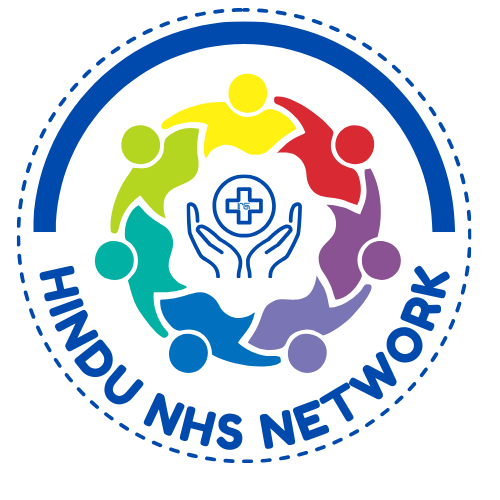🕉️ Hindu Chaplaincy Training
🕉️ Hindu Chaplaincy Training
The provision of spiritual care is a vital, yet often under-recognised, component of holistic healthcare. Within the NHS, chaplaincy services play a pivotal role in supporting patients, families, and staff through moments of crisis, illness, and transition. However, for many Hindu patients and professionals, access to appropriately trained chaplains who understand and reflect their spiritual worldview remains limited. The Hindu NHS Network (HNN) is proud to address this gap by developing and promoting a robust, culturally rooted, and spiritually authentic Hindu Chaplaincy Training Programme.
Our chaplaincy training initiative is designed to prepare individuals—whether they are faith practitioners, healthcare professionals, or community volunteers—to serve effectively as Hindu spiritual carers in NHS and other healthcare settings. The training acknowledges the rich plurality within Hindu traditions, while also equipping chaplains with the professional skills needed to offer non-judgemental, inclusive, and trauma-informed spiritual support to individuals of all backgrounds.
🌿 Objectives of the Programme
The core aim of the Hindu Chaplaincy Training Programme is to:
-
Develop spiritually grounded, emotionally intelligent Hindu chaplains for NHS hospitals, hospices, and care homes
-
Provide practical skills to offer support during birth, illness, surgery, bereavement, and end-of-life
-
Train chaplains to navigate the healthcare environment professionally while maintaining spiritual authenticity
-
Bridge the gap between religious tradition and NHS frameworks for pastoral care and safeguarding
-
Ensure culturally congruent, scripturally informed, and ethically sound support for Hindu patients and families
-
Foster resilience, empathy, and reflective practice among trainees, who may also serve fellow NHS staff
📘 Core Curriculum
The programme includes structured modules covering:
-
Introduction to Hindu Dharma and its Relevance to Healthcare
-
Understanding Human Suffering, Karma, and Spiritual Resilience
-
Hospital Protocols, Confidentiality, Consent & Ethics in Chaplaincy
-
Rituals and Prayers: Mantras, Bhajans, Last Rites, and Festival Observance
-
Supporting Patients Through Grief, Loss, and End-of-Life Transitions
-
Communication Skills, Active Listening, and Pastoral Presence
-
Working in Multi-faith and Interdisciplinary Chaplaincy Teams
-
Spiritual Assessment and Reflective Practice
-
Faith-Sensitive Mental Health Support and Suicide Prevention
-
Self-Care for Chaplains: Managing Emotional Burnout and Boundaries
Training combines in-person sessions, online modules, shadowing NHS chaplains, and supervised reflective journaling. It is delivered in collaboration with existing NHS Chaplaincy departments, Hindu theological scholars, senior swamis and sadhus, interfaith educators, and bereavement care professionals.
🪔 Unique Features
-
Grounded in Sanātana Dharma: The programme integrates scriptural wisdom from the Bhagavad Gita, Upanishads, and Bhakti texts
-
Pluralistic Approach: It honours all Hindu traditions—Shaiva, Vaishnava, Shakta, Arya Samaj, Sanatan, ISKCON, Swaminarayan, etc.
-
Accredited & Endorsed: The programme is aligned with UK Board of Healthcare Chaplaincy (UKBHC) standards and NHS Spiritual Care Codes of Practice
-
Culturally Competent: Emphasises language sensitivity, dietary practices, modesty norms, and ritual timing critical to Hindu service users
-
Empowering Youth & Women: Encourages diverse participation across genders and generations for future sustainability
🏥 Integration with NHS Spiritual Care
HNN works closely with NHS Chaplaincy teams, Trusts, and Integrated Care Boards (ICBs) to ensure trained Hindu chaplains are:
-
Recognised and included in rota systems alongside other faith providers
-
Engaged in multi-faith responses to major incidents, public health emergencies, and bereavement services
-
Included in hospital policy-making around sacred spaces, religious holidays, and end-of-life protocols
-
Supported in continuous professional development and interfaith dialogue
Hindu chaplaincy also plays a crucial role in staff wellbeing, offering confidential listening, spiritual coaching, and cultural guidance to Hindu NHS workers, especially during high-stress periods such as pandemics or workplace conflict.
🙌 Who Can Apply?
-
Practising Hindus with deep faith and commitment to seva (service)
-
NHS staff interested in spiritual care roles
-
Temple volunteers, bhajan leaders, yoga teachers, or retired professionals
-
Community leaders with compassion and maturity
-
No previous chaplaincy experience is required, but a willingness to learn and serve is essential
📩 How to Get Involved
Interested individuals can express interest by visiting www.hindunhs.net/chaplaincy-training
or emailing chaplaincy@hindunhs.net
. Applicants will be invited for an initial dialogue to explore their calling, spiritual depth, and readiness for this sacred role.
